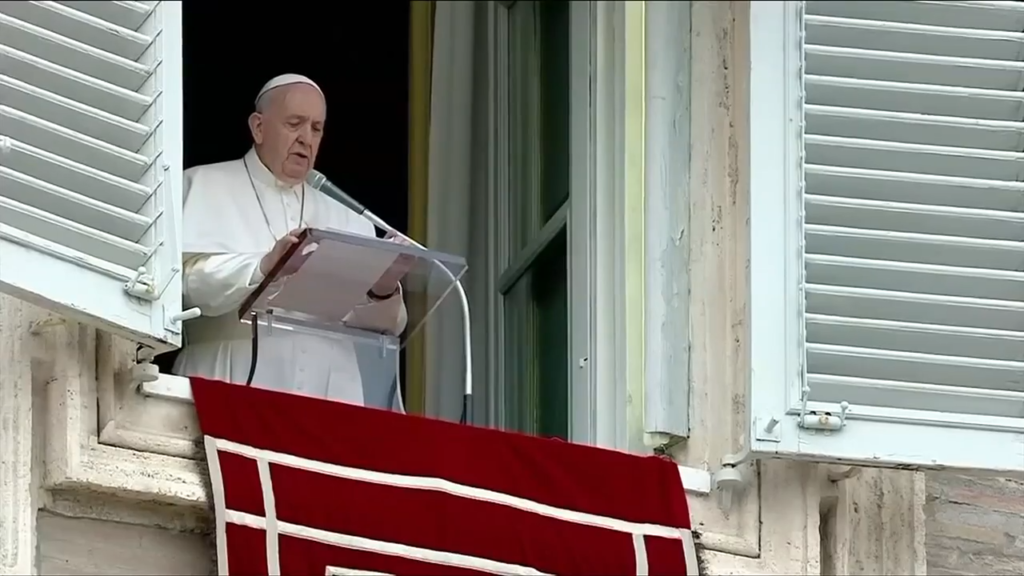
Two hundred and fifteen pairs of shoes, as well as teddy bears, lined the outside of Victoria’s St. Andrews Cathedral Sunday morning, with the woman behind it is calling on all Victorians to help send a message to the church.
“If you come by Blanshard and View, keep honking your horns. Let the church know that you back us on this, this is so very important,” said Lou-Anne Neel on Facebook.
The symbolic gesture was done as part of an effort to honour those whose remains were recently found at a Kamloops residential school and to highlight the part played by the Catholic Church in Canada’s residential school system.
It comes as Pope Francis said he is following news of the findings “with pain” but did not apologize after leading the Angelus prayer on Sunday.
“I join the Canadian bishops and the entire Catholic Church in Canada in expressing my closeness to the Canadian people traumatized by the shocking news,” he said.
The Pople also did not mention Trudeau’s call for him to apologize for the Catholic Church’s role in Canadian residential schools and his overall response didn’t sit well with Skwah First Nation Elder, Edward Gardner.
“It disturbed me that the Pope did not accept responsibility for the churches role in what Truth and Reconciliation Commission came out with declaring that those residential schools were responsible for cultural genocide,” Gardner said.
CHEK News reached out to several Catholic churches following the Pope’s address but have not heard back. However earlier this week the Bishop of Victoria, Gary Gordon did issue an apology, part of which read “On behalf of the Roman Catholic Diocese of Victoria, I apologize for the harm caused due to our complicity involved in the operations of the residential schools. I am committed to the process of healing, reconciliation, and education regarding this tragic history.”
At noon Anglican church bells could be heard ringing 215 times all across Vancouver Island, as more groups try and take responsibility for their actions.
But Gardner says, there’s a long way to go.
“There’s a lot more research and a lot more covering that needs to be done and we’ll continue to push this so that the truth comes out,” he said.
Meanwhile, the archbishop of Toronto, Cardinal Thomas Collins, expressed “great sorrow” Sunday for the abuse that took place at Canada’s residential schools, though he insisted that Prime Minister Trudeau was “unfair” in his calls for the Catholic Church to take more responsibility.
Collins expressed sadness for the rampant suffering endured at the institutions, both in an interview with The Canadian Press and in remarks delivered at a service in Toronto.
He said the Church as a whole has also owned up to its role in the system and chastised Prime Minister Justin Trudeau for seeking further action.
“I would think that Mr. Trudeau and his government … should join with us and with the Indigenous people in our journey together,” Collins said in a telephone interview. “We want to work together. These types of sharp comments, which are not based on real fact, are most unfortunate.”
As the Pope addressed his congregation Sunday in the heart of Vatican City, Collins was inviting his own assembly from Toronto’s St. Michael’s Cathedral Basilica to bow their heads and honour those who died in Canadian residential schools.
The system targeted Indigenous children for decades, and some 150,000 First Nations, Metis and Inuit children were forcibly sent to the institutions where many suffered abuse and even death.
The issue was propelled back into the national spotlight 10 days ago when the Tk’emlups te Secwepemc First Nation in British Columbia announced that the remains of 215 Indigenous children are believed to be buried at an unmarked site at the former Kamloops Indian Residential School. Ground-penetrating radar confirmed the findings, the First Nation said.
Saskatchewan’s Federation of Sovereign Indigenous Nations is also demanding an apology from the Pope, saying it is the right thing to do.
“This was genocide, and it should be acknowledged as such by the perpetrators, the Church, the Government, and the RCMP,” the organization representing 74 of the province’s First Nations said in a release Sunday.
Lawyer Mary Ellen Turpel-Lafond said she appreciates what seems to be a “heartfelt commitment” from the Cardinal to provide unmitigated access to records that would help family members identify residential school victims, especially those from the school in Kamloops.
But those in power have “taken positions contrary to the words expressed today,” Turpel-Lafond, the director of the Indian Residential School History and Dialogue Centre at the University of British Columbia, said in an email Sunday.
She, too, called on “the highest authority in the Church” to apologize and direct that all records and archival material be released without exceptions.
“Leaving First Nations in limbo to engage with the dozens of church congregations, past and present, does not reflect a fulsome human rights approach,” she said. “Canada needs to do better.”
With files from The Canadian Press
READ MORE: ‘Convenient ignorance:’ Canadians’ knowledge of residential schools woefully lacking




